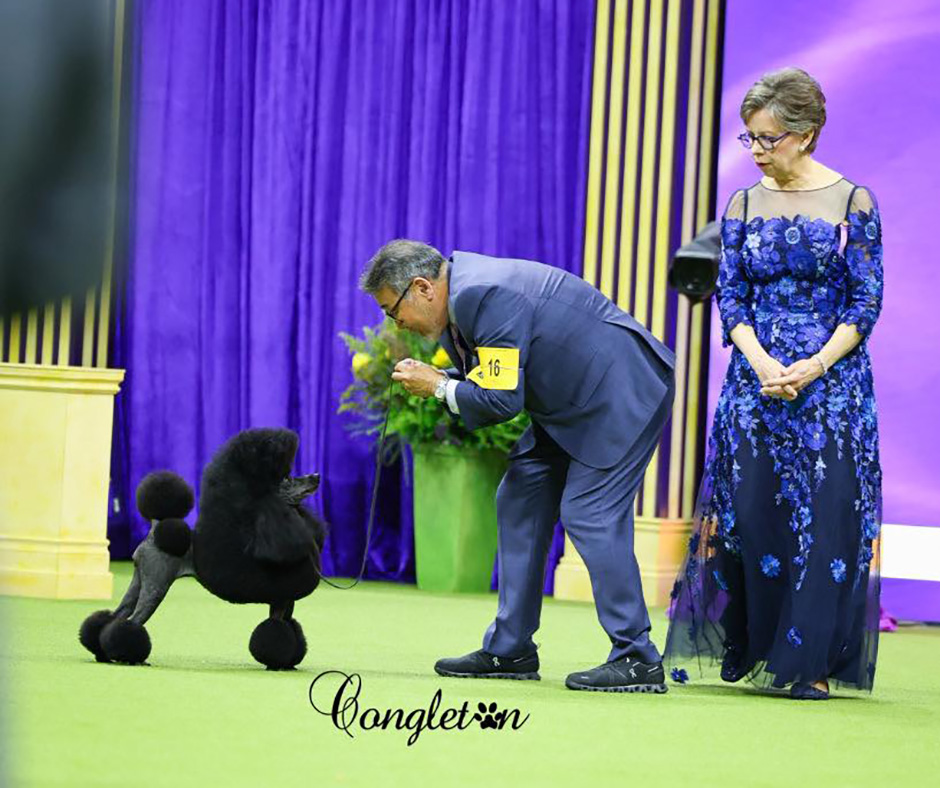634 – Best Advice from Best in Show Judge, Roz Kramer
Best Advice from Best in Show Judge, Roz Kramer
Roz Kramer, Best in Show judge for Westminster Kennel Club last week, joins host Laura Reeves with advice, stories, suggestions and tips for all exhibitors.
On judging Best in Show at Westminster
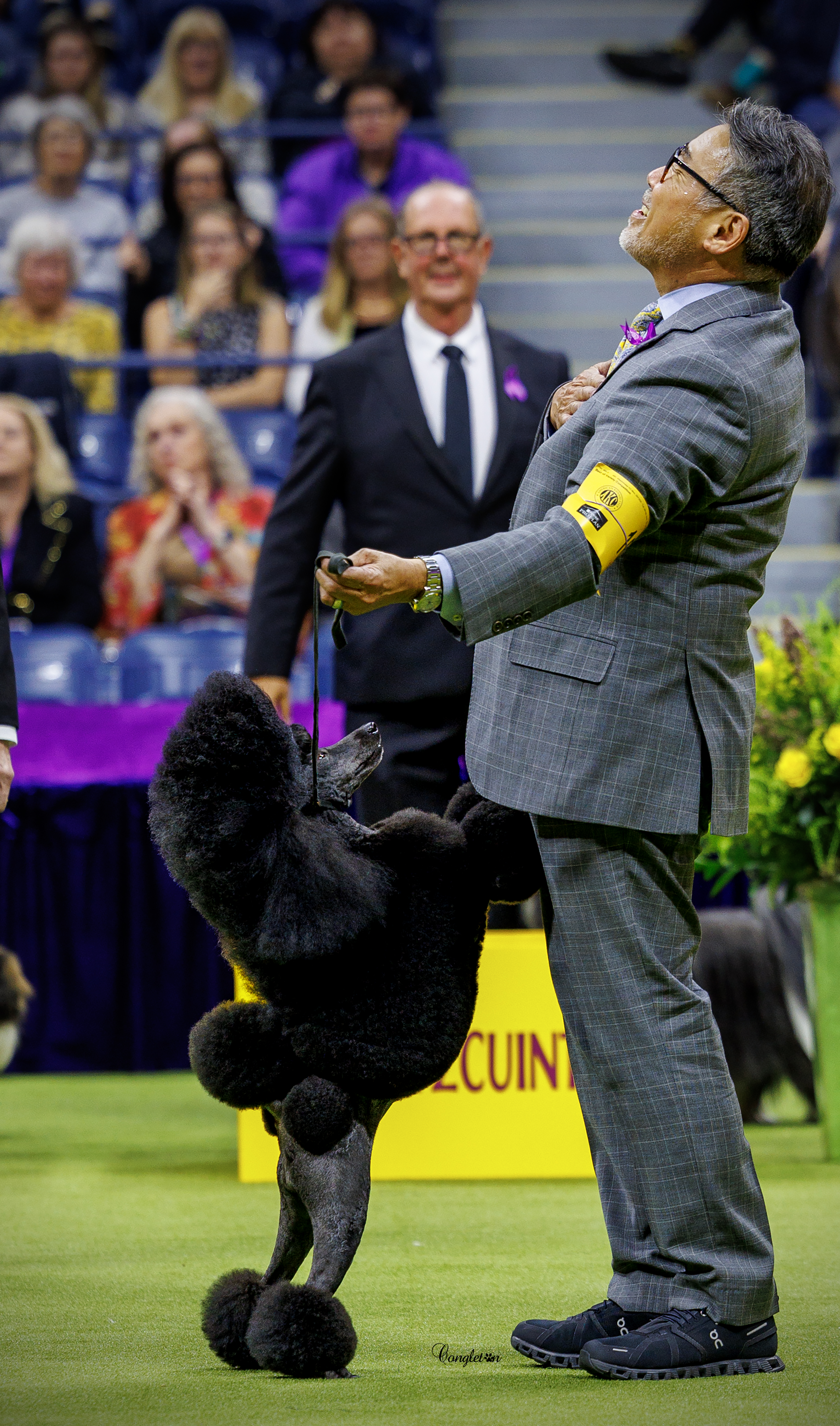
Kaz Hosaka, winning BIS at WKC with the Miniature Poodle, Sage.
“You know, you’re sequestered and so you don’t really know who you’re getting and they come in the ring one at a time and it was one gorgeous dog after another.
“I mean, all of them showed like a million bucks. They all looked wonderful, fabulous condition. And it gave me goosebumps. It really did. I was so happy and so thrilled.
On her mentors
“I have had three incredible mentors for me Annie (Rogers Clark), Janey and Bob (Forsyth). I had so much respect for the three of them. Annie, she was such a teacher in many ways. I never worked for any of them, but you saw them at shows all the time and they’d give you little hints or little suggestions all the time and or you’d just sit and listen to them and you’d learn.
On how newer exhibitors can succeed
“You should stick around (after showing in the ring), learn your history of your breed, learn who the greats of the breed were, learn your pedigrees, figure out who the best multiple breeders of your breed, and it wouldn’t matter if they’re ones on the west coast and ones in Texas and ones in Maine. Seek those people out, learn the best you can. And then if you get a dog, don’t be afraid to go, not just ask other breeders for help on trimming or showing.
“I’m telling you, you go to most of these handlers, it doesn’t matter who they are, they are more than willing to help. We need the new people in the sport and everybody knows it and I think that what people also need to do is don’t think that you’re better than everybody else, be kind and caring to people because you know something, we all have to ask for help at some point in our lives and don’t be afraid to.
“You know one of the ways that I learned when I was a kid is my mentor on the Scotty’s John Sheehan. He’d trim the show side and then he’d say ‘okay now you trim the other side. Copy that.’
“(There) is the conditioning part. And it was a teaching tool to me that you do this day after day, hour after hour, and don’t stop. And it’s going to pay off.
“It’s artistry, and I think people prefer the quick fix and the easy fix. I think that people should give themselves a challenge, prove what they can accomplish and they might be surprised.”
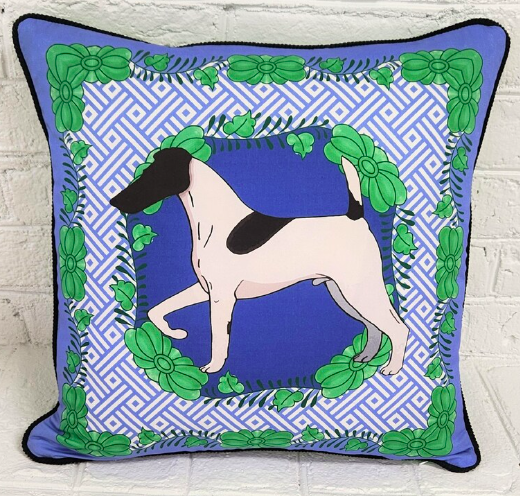
Kramer’s Etsy shop features home decor and fashion items like this pillow cover.
Visit Kramer’s Etsy shop to see her beautiful breed specific designs on home decor and fashion items.
391 – “From the Mouths of Babes”: Learn From Youth
“From the Mouths of Babes”: Learn From Youth
The dog world is frequently seen as “eating its own” – in other words scaring away new folks who are trying to learn. So, I decided to try learning from the new people. I talked to exhibitors who are just getting started, what gave them encouragement to become involved and stay involved. This is the second of these conversations. You can listen to the first one here.
Today we talk with Emily Wright, Jessica Deardorff and Justus Lucey, folks from all across the country, all across breeds, all across ages. I *hope* these people are the future of our sport, because it will be in good hands.
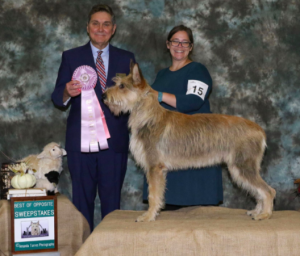
Emily Wright and her Berger Picard Sketchbook Over and Out, Roger
Emily Wright: We call it Team Sketchbook. We approach it as a team. (Liz Hansen) has made herself incredibly available and that’s a special kind of thing. That’s the best thing I can say for people who are long-term breeders or professional handlers or whatever it is. Making yourself available and then not making people feel stupid …try to keep your eye rolls on the down low because I’ve not come from any kind of (dog) background or anything like that. (I’m) studying all of those things and now learning how to put the best of this dog together with the best of that dog and … these breedings and those pedigrees … it’s just so cool to be able to carry on …
Justus Lucey: I count anyone who had taught me something valuable and taken some time to teach me a mentor … I haven’t really had a lot of bad experiences, other than you know there will always be those few that don’t want you to succeed. You have to have thick skin sometimes and surround yourself with the ones that are sincere and honest with you and happy for you.
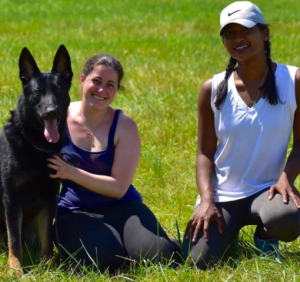
Jessica Deardorff and Hawk von Nadar with his breeder, Ash Nadar
Jessica Deardorff: Honestly, I wish clubs modeled more after horse clubs. In horses you buy a pony and you get membership … and off you go. You show, you get medals. The barrier to entry is very low … if you want to join a dog club, you really don’t just buy a dog and send a membership in. I really feel that clubs could do so much more to not just educate dog fanciers but just the general public … I really think if that model was followed you see the little shift in dog ownership in education.
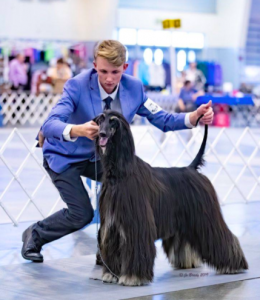 Justus: The dog people can learn so much from the horse people. I also think that the horse people can learn so much from the dog people. I think that there’s very similar principles. I find that at the horse shows, at the barrel races, the sportsmanship is outstanding. Even if the big winning horse at the time has a total failure of a day, the rider is always so nice. Great sportsmanship to everyone else. I find that dog people can be a little more grumpy.
Justus: The dog people can learn so much from the horse people. I also think that the horse people can learn so much from the dog people. I think that there’s very similar principles. I find that at the horse shows, at the barrel races, the sportsmanship is outstanding. Even if the big winning horse at the time has a total failure of a day, the rider is always so nice. Great sportsmanship to everyone else. I find that dog people can be a little more grumpy.
Emily: I was super heavily involved with rescue. And I was super on board with adopt don’t shop and now I see the error in my ways because both of them are very valid … in my performance events my rescues weren’t cutting the mustard, frankly. I adore my rescue (but) that was one of the big things that changed (my mind) and then another part of it was the health … I think about how much I spent on my rescues at the vet. I’m like well if I’d spent on a well-bred dog … and I just see how many of my friends rescues have died early deaths.
343 — Saturday Symposium – Preservation Breeding With Experts
Saturday Symposium – Preservation Breeding With Experts
Host and Moderator Laura Reeves is joined by breeders/judges Lesley Hiltz, Sid Marx and Karen Ericson at the Whidbey Island Kennel Club with a robust conversation about preservation breeding. This is part one. Part two, including audience participation, conversation and more idea generation will be posted next Monday.
Preservation of our breeds to save their place in history

Lesley Hiltz
“When you judge in Europe,” Hiltz noted, “the average exhibitor age is mid 30s. There are lots of families, often three generations together. It’s a family sport. But they also only have one show a month. If we had fewer shows we could see more support for the ones remaining.”
Marx observed that too often exhibitors haven’t even read the standard for their breed.
“People become captive to what’s winning. Breeding to what’s winning rather than what’s correct. We want to get as many new young exhibitors involved in the sport as we can. But they need to make an effort to find mentors and learn the history of their breed,” Marx said.

Sid Marx
Ericson encouraged folks to “Get our dogs out among the public.” Clubs need to do things besides dog shows, she added.
“To get a dog from a breeder, you might as well apply to be a CEO of a fortune 500 company,” Erickson said. “Trust people with your best, not your worst. Tell them you are trusting them with a piece of my heart and legacy.”
“Dog shows in Australia are less stressful and more fun,” Marx said. “Certainly more wine is drunk. It’s a party at their shows. It’s an event.”
Proactive policies
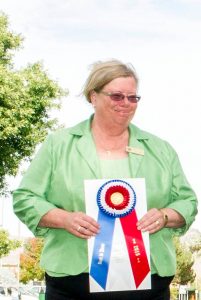
Karen Ericson
Some ideas from the panelists:
- Encourage altered dog competition
- Encourage anyone who shows a spark to come to the dog show. Stop what you’re doing and share with public. Share excitement about the show.
- Bring back dog shows that stop at the breed level. Rankings are hurting us. The average person isn’t at the dog show to fight for Group 1.
- Follow Austalia’s lead: “class in group awards.” So if your 6-9 puppy wins his class, he competes in 6-9 competition in group. People stay for group, talk to other people in other breeds. Gives a whole lot of other people the chance to win something in group.
To hear previous discussions on this topic, click here and here
314 – Dog Shows Through the Eyes of Newbies
Dog Shows Through the Eyes of Newbies
I was honored to visit with four brand “newbies” recently in a panel discussion format. These folks shared truly valuable information about what got them started, what they love and even what they don’t.
Huge thanks to listener Dr. Clifton Jamil Kenon Jr whose idea this was. The announcement on PureDogTalk’s FB page garnered 147 comments from folks who were so excited to share their experiences. I hope to make a continuing series of these types of conversations because the stories I received were so amazing.
Kenon, Kristin Eberly, Neil Trilokekar and Kayla Croteau represent a wide spectrum of the dog fancy. They share their fascinating journeys into the sport of purebred dogs, talk about mentors, what they love and what has been frustrating in each of their individual experiences.
Mentorship
“Meet people where they are,” Kenon advises mentors and would be mentors. “Everyone comes to the table with their own goals. This is a sport that lends itself to diversity.” Kenon’s mentor, Susan Giles, visited with me on the podcast just recently.
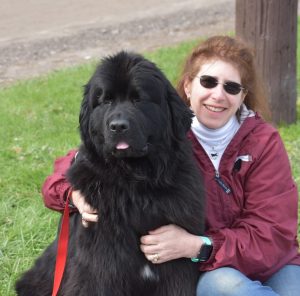
Kristin Eberly
The best help Eberly found is from her handling class instructor, who she says offers “criticism wrapped in something positive.”
Trilokekar said his mentors have encouraged him to study and think critically. “They share their knowledge without expecting me to be obedient,” he noted.
Croteau said her mentor is always open to the silliest of questions and is always positive.
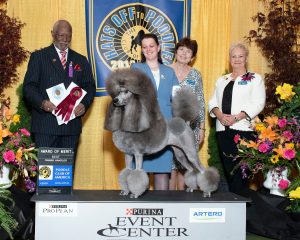
Kayla Croteau
Strongest encouragement
- “Set your own goals,” Kenon said. “Celebrate the wonderful people who help you get there. Ignore the people who want sink everybody’s ship. Don’t go broke doing it. Have fun.”
- “Don’t be afraid to ask for help,” Eberly offered. “Long time people in the breed can be intimidating. Those people will help you if you just ask.”
-
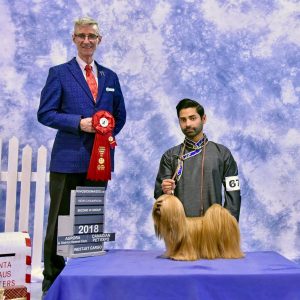
Neil Trilokekar
“Find your fascination,” Trilokekar encouraged. “So many facets you can be engaged by. Learn about history, and heritage of your breed. Go do other things with people when you’re at a dog show. Build a relationship. Never stop learning.”
- “Coming in it was pretty terrifying,” Croteau opined. “Remember we’re all here because we love the dogs. Set small goals. Don’t just come to the show, show and go home. Hang out. Have an open mind and big ears.”

